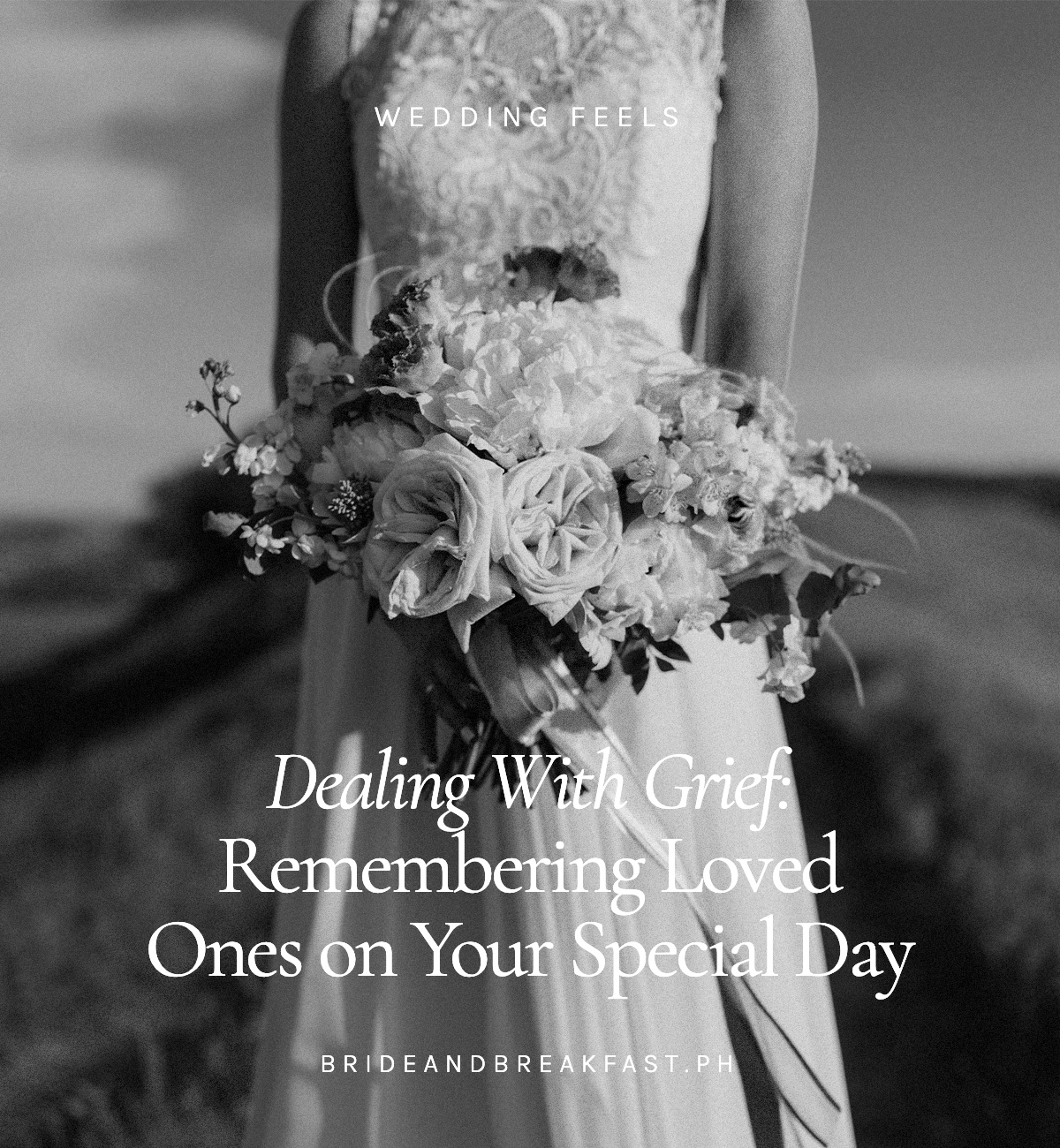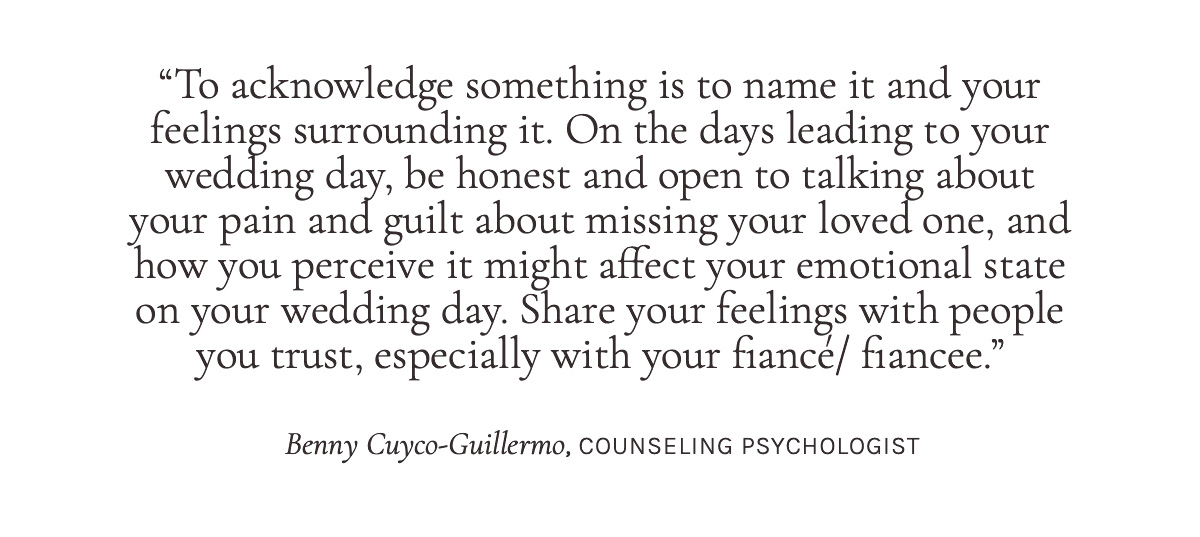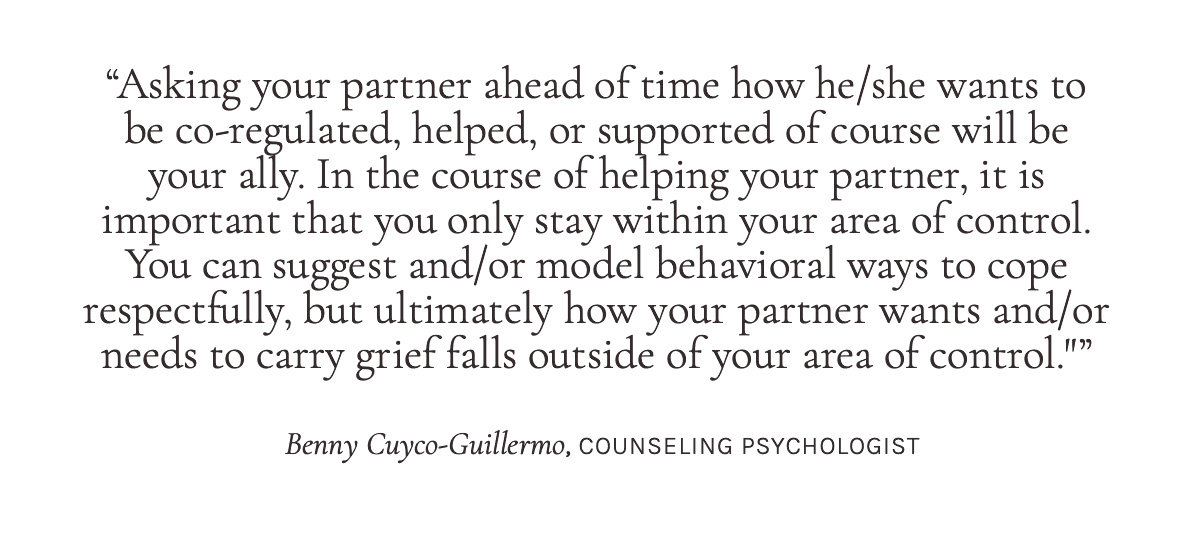A wedding is one of the most significant and joyful occasions in a person’s life. It’s a day adorned with flowers, laughter, and the warmth of family and friends. But, for those who have lost a loved one, this special day can also carry an undercurrent of sorrow and yearning. It’s a bittersweet feeling: to want someone there to celebrate with–a parent, a sibling, a friend, or a loved one in general–but they’re no longer around.
Grief, in its many forms, has a way of making its presence known, especially during milestone events like weddings. While it might seem counterintuitive to welcome grief into a space of celebration, acknowledging this emotion can lead to a deeper, more meaningful experience. It’s about honoring those who are no longer physically present, but whose impact and love still resonate in our lives.
In this article, we sought insight from counseling psychologist Benny Cuyco-Guillermo on how to deal with such emotions. With her expertise, she provides advice to couples on handling grief, ensuring their wedding reflects both joy and the loved ones they miss.


Cuyco-Guillermo emphasizes the importance of recognizing and welcoming grief, stating, “Carrying grief on your wedding day may be regarded as atypical by you or by the people around you, but looking at it from a special place may add more meaning to your wedding day celebration. Grief is not a place you move on from but a part of yourself you move forward with.”
To cope with grief, one must first acknowledge its presence and embrace it as a natural part of the wedding experience. In the days leading up to the wedding, engage in open and heartfelt discussions about your feelings of loss, pain, and guilt, sharing these thoughts with people you trust, particularly your future spouse. “The moment you start to feel guilty about your grief is usually the right moment to talk to him or her about it,” she advises. This creates a supportive environment and ensures you’re not dealing with your grief alone.


The wedding day provides an opportunity to honor and remember the loved ones who have passed away. Cuyco-Guillermo suggests, “You can acknowledge grief by recognizing the departed in one of your speeches and his/her influence on your life.” By doing so, you’re creating a space for them in your celebration, whether it’s through sharing memories, including their initials, or displaying a small picture during the ceremony. These acts of remembrance help maintain a connection with the departed, integrating their memory into your special day.

Support from your partner is crucial when dealing with grief. Cuyco-Guillermo highlights the importance of understanding and patience: “Your partner needs to hold his/her grief for as long as he/she needs to and you have to be okay with that; You need to accept that.”
Recognizing that your partner’s grief is not a rejection of you or your relationship allows for a supportive and empathetic connection. Provide comfort through physical touch, reassuring smiles, and kind words, ensuring your partner feels safe and loved. “Your arms and your presence ideally should be the safest place on earth for your future spouse,” she reminds us.


Effective communication is key in navigating grief together. “Being gentle, showing interest, validating each other’s feelings, and behaving in an easy manner during grief conversation are some ways to help the couple get to an understanding,” says Cuyco-Guillermo.
By maintaining open lines of communication, expressing empathy, and validating each other’s feelings, you create a supportive environment. She also advises that if conversations about grief become challenging, don’t hesitate to seek the guidance of a professional counselor, particularly for premarital counseling.

Understanding the dual nature of weddings is vital. Cuyco-Guillermo notes, “Weddings are bittersweet because weddings symbolize endings and beginnings. So if you think about it, weddings allow you to feel seemingly polar opposite feelings, including joy and sadness, longing and excitement at the same time. When you can accept that grief can coexist with pleasant feelings, giving it a seat at the table on your wedding day will add a rich layer of meaning to your experience and recollection of your wedding day.”
By giving grief a place at your wedding, you are acknowledging the complexity of your emotions, ensuring a genuine and heartfelt celebration of both your love and your loss.

In hindsight, acknowledging grief at your wedding helps you be real about your feelings, even when you are happy and celebrating. By talking about and remembering a loved one who passed away, you can make them part of your special day. You can share stories, have a moment of silence, or use something that belonged to them in your ceremony. This helps everyone feel supported and shows that it’s okay to miss someone while also being happy. Embracing grief in this way makes your wedding more meaningful and shows that love lasts, even when someone is gone.









